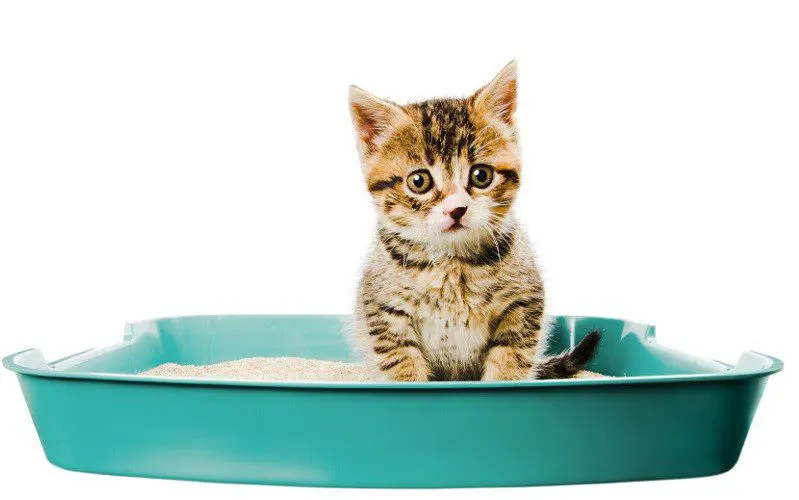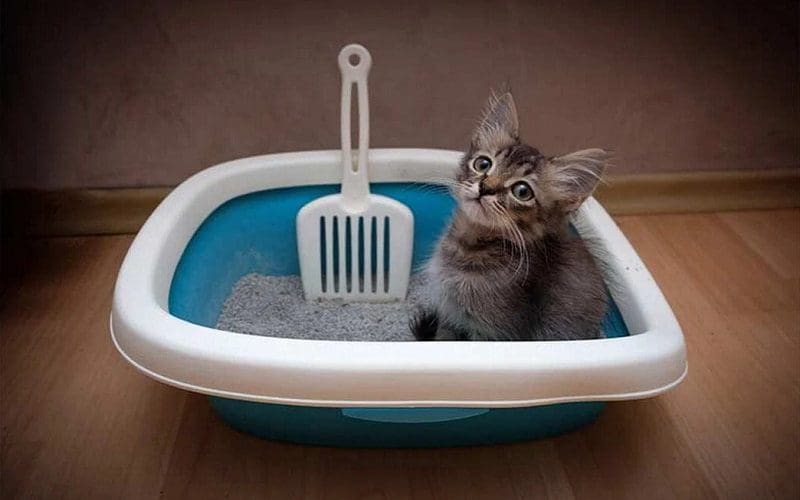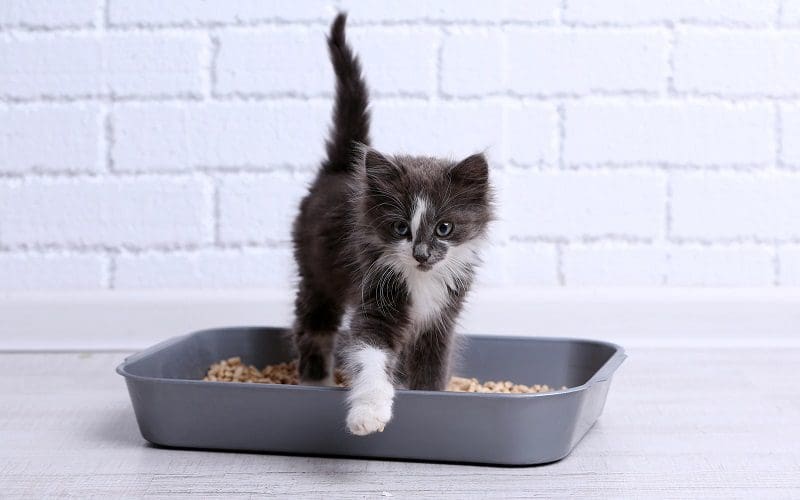Last Updated: 7 months ago
Looking for easy ways on how to litter train a kitten?
Here’s the good news: it’s actually quite simple!
Check out five tips on how to litter train a kitten or cat successfully!
5 Tips On How To Litter Train A Kitten Or Cat
Litter training a kitten or cat is a fundamental aspect of responsible pet ownership.
Whether you’re welcoming a new furry friend into your home or helping an older cat adjust, proper litter training is key to a clean and harmonious living environment.
Let’s embark on this journey to ensure a stress-free and comfortable experience for both you and your beloved cat.
#1 Eliminate Health Concerns

One of the first considerations – as with most things related to your pets – is to make sure that there are no underlying health issues causing your cat’s reluctance to use the litter box.
This is especially crucial if you have a cat that was using the litter box but stopped suddenly. Cats don’t like to show pain, but sometimes their behavior gives it away.
If they are uncomfortable using the box for whatever reason, they may associate the location itself with the pain and begin to avoid it whenever possible.
Urinary tract and bowel problems can be dangerous or even potentially fatal to your cat, especially with infections and/or blockages, and time is of the essence with their treatments.
Once you know your cat is in good health, there are a few tricks you can try for litter training.
#2 Location, Location, Location
Cats are very private animals.
It’s hard to believe when they’re lying spread-eagle in front of you, licking themselves while making inappropriate eye contact, but it’s true nonetheless.
Placing the litter box in a secluded location in your house where your feline friend feels secure may appeal more to them than an open area in full view.
#3 Add Them Up

Experts recommend one litter box for each cat in the household, plus one extra.
Cats can be somewhat territorial and may not use a box that smells too strongly of another animal.
If you have recently made an addition to your family, it may be necessary to add another box to ensure that your new family member and the already established members continue to follow the house rules.
#4 Clean Thoroughly And Often
Litter boxes should be cleaned frequently to keep your cats happy and to keep them from stinking up your home.
Monitoring the litter boxes has the added benefit of keeping you aware of anything that might be unusual with your cat’s system.
It is more complicated if you have multiple cats, but knowing that there is something to look for can alert you to further symptoms that otherwise might not have been alarming.
Cleaning up any places where there have been accidents is also vital, as the smell of urine can draw cats back to the spot to repeat the process or draw other cats in the household there to dispute the territory.
#5 Try Different Litter Box Styles And Litter Types

We have five cats at the moment. Two of them will not use a covered litter box; one has to have high-backed boxes because he will pee over the edge of the box otherwise, and two will not use a litter box that isn’t covered.
If your cat is refusing to use a litter box, especially if they are new to the household, it may be that there is something about it that they don’t like that is causing them anxiety in the form of claustrophobia or feeling vulnerable.
By the same token, the litter itself and the fact that there are so many litter types out there may be the problem.
Some cats will not use a litter with any scent, while others don’t like the feel of granular litter under their feet, especially if they’ve been declawed.
Successful Story
At the age of 17 and still living at home, her parents brought home a beautiful long-haired dilute tortoiseshell cat from the local Humane Society. Sasha was just shy of a year old and had nothing but skin, bones, and fur.
She limped horribly from a badly broken hip that never healed properly, and her back leg would slip out to the side on the wood floors, giving her an almost peg-legged walk.
They were thrilled when she began to gain weight after only a week or so with them, but that all came to a head one morning at the breakfast table when she casually pointed out that all of her new-found weight was in her stomach.
A quick examination confirmed their suspicions: she was pregnant; their new cat was a package deal. You might be wondering where this is going; don’t worry. There’s a point, and it’s even related to litter training.
Sasha was perfectly litter trained before they got her; they don’t remember once in her 15 years with them that she ever made a mess.
When she was getting close to giving birth, they gave her a cardboard box lined with towels and an aluminum pie plate filled with cat litter, which fit neatly in the corner of the box.
When the kittens were born, she had to help them eliminate for the first while, but once they were on their own, they used the pie plate exclusively until all had graduated from the cardboard box.
After that, they used the regular litter box. The extent of their training with Sasha was to show her where the box was the day they brought her home.
She taught the kittens to use the pie plate and to cover their own waste. She even showed them where and how to use the big boxes when they were ready. Those kittens never had any accidents, either.
The point? Right. Getting to the point: cats are incredibly tidy animals. They will do what they can to toilet away from their living areas, both for neatness’ sake and in order not to attract predators to their young.
In most cases, a cat wants to use the litter box, and typically all you will have to do to litter train your cat is show them where it is.
If this isn’t the case, however, there are things you can do to convince your cat to “go” where you want them to.
Wrap-Up
As frustrating as it can be, the best way to get your cats to use the litter box is often patience and trial and error.
If their mental and physical health are taken care of, your cats will most likely settle into a tidy routine quite happily.
Do you have any other tips for how to litter train a kitten? Please share in a comment below!
Resources:


We used a covered litter box and had the easiest time training our cat to use his litter box. After reading your post I realized we may have had some issues with litter box training had we chosen another type of litter box.
have had many cats, never needed to train one to the litter box; they all seemed to instinctively understand. New kittens have begun their life here in a bathroom with their own box, dishes, and beds for a week or so, and again, never needed training. We’ve always had one more box than the number of cats, and they’re in a corner of the basement behind a shelf unit, so they have privacy. We clean them every evening! 5 boxes.
Cats are very smart animals and they seem to learn, very fast, about the litter box. I used to have a cat and she was very easy to train, but definitely loved her privacy. Great article.
I have tried so many different types of cat litter. I finally found one I like and the cats don’t mind. They are so good about using the box as long as it’s clean!
I have only trained one kitty and she was so easy. Didn’t know exactly what to do so if I ever need to do this again I will know the steps. Getting the right litter is important.
These are all tips that make sense. We’ve never had a problem training a cat to use a litter box, we just put them in it on day one and that’s all.
Zo was het ook bij ons. Ze was zindelijk als we ze in huis haalden.
I’m allergic to cats so I’ve never had one in my home. I did help a neighbor with their cat when they were on vacation and scooping the litter is no fun.
These are great tips. I know that our cats don’t like it when their box isn’t perfectly clean!
This is something I haven’t really dealt with yet but I did know it was good to have one extra litter box. We were lucky that our cats took to their litter boxes well!
I don’t have any tips to add, I’ve never owned a cat. Cats are really particular about their cleanliness and I like that.
This is a great explanation of how to litter train a cat. I only have a dog so this was all new to me.
I didn’t know you had to train a cat to use the litter box. This was so interesting. I’ve never had a cat, so I know nothing about them.
My kids have been wanting to get a cat. We are thinking about getting one in the near future. These are great tips for a litter-trained cat.
These are such great tips! I agree that the location is super important. Cats are so super smart, they have to be the easiest to train!
I’ve always been so surprised at how easy it is to litter train a cat. I love that they’re so easy to train lol
Another tip is to use the same cat litter the breeder or rescue centre used. If a kitten or cat is already used to a particular litter texture under their paws it often doesn’t adapt well to a changed texture.